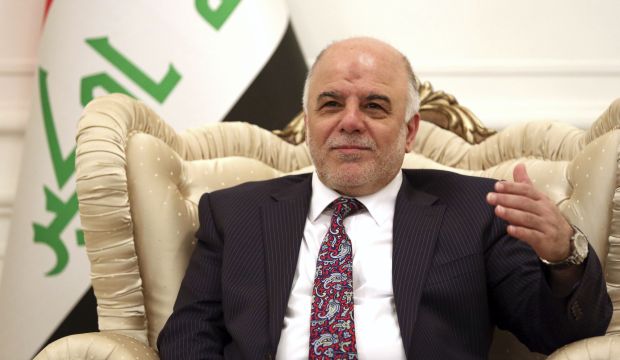
In this August 16, 2014 file photo Iraq’s Prime Minister Haider Al-Abadi smiles during a meeting with Germany’s Foreign Minister Frank-Walter Steinmeier, in Baghdad, Iraq. (Reuters/Hadi Mizban/Pool)
London and Amman, Asharq Al-Awsat—Iraq’s government continues to sideline confessional and ethnic minorities in the country, according to a senior Iraqi official.
Speaking to Asharq Al-Awsat on Saturday, the official, who heads a prominent political bloc in the country, said the current government of Prime Minister Haider Al-Abadi continued to discriminate against Sunnis and Kurds in the country.
“We were expecting things to change under the leadership of Haider Al-Abadi, but unfortunately he is following the same policies of his predecessor Nuri Al-Maliki, especially since Malki heads Abadi’s party [the Islamic Da’wa Party], and so Abadi follows Maliki’s advice regarding how to deal between different political factions in Iraqi,” said the official, who asked to remain anonymous.
“Iraq has until this day not been able to get rid of the one-party rule and the dominance of one political faction and one sect,” the official added.
Under Abadi, Iraq’s current government has continued to rely on Shi’ite volunteer militias, known as the Popular Mobilization, to fight the spread of the Islamic State of Iraq and Syria (ISIS) in the country. According to the official it has also followed Maliki’s course on how it has approached Iraq’s national reconciliation process, meant to find consensus between all the country’s myriad ethnic, confessional and political groups.
The official said that even the dominant Shi’ite parties and groups were divided in the country, with the Islamic Supreme Council of Iraq (ISCI), a Shi’ite-led political party, and the Sadrist Movement representing “moderate” strains unable to control more “extremist” elements such as the Popular Mobilization, Iraq’s branch of Hezbollah, and the Quds Force, a division of Iran’s Islamic Revolutionary Guard Corps which has also entered the fight against ISIS in Iraq.
The official accused the government of being negligent by giving free rein to Iran and these Shi’ite groups under the guise of fighting ISIS. The Popular Mobilization, which has been at the forefront of the fight against ISIS, has been accused by various international organizations of committing atrocities against civilians in areas of the country it has liberated from ISIS. These include mass killings of Sunnis, and burning and destroying entire Sunni-dominated villages.
Meanwhile, in Jordan, the body of Tariq Aziz, the former Iraqi vice president who served under Saddam Hussein, was laid to rest in Madaba, 20 miles (35 kilometers) southwest of the capital Amman, following a funeral procession attended by hundreds of Iraqis and Jordanians.
Aziz’s family had earlier requested the Iraqi and Jordanian governments allow him to be buried in the Hashemite kingdom, where several of them currently reside.
Aziz died at the age of 79 in prison on June 5 after suffering a heart attack. As one of Saddam’s inner circle he was imprisoned following the US-led invasion of Iraq in 2003, and eventually sentenced to death in 2010 for his involvement in “crimes against humanity.”
Mohamed Al-Da’ama contributed reporting from Amman.
